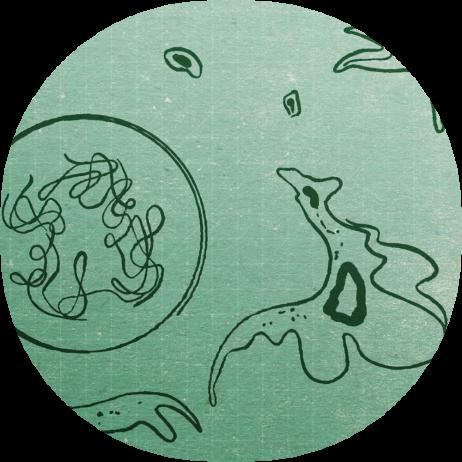APOL1-mediated kidney disease
Vertex is focused on discovering, developing and producing innovative medicines so people with serious diseases can lead better lives. Our scientists don’t see the impossible as an obstacle; they see it as a good place to start.

Vertex is focused on discovering, developing and producing innovative medicines so people with serious diseases can lead better lives. Our scientists don’t see the impossible as an obstacle; they see it as a good place to start.
About APOL1-mediated kidney disease (AMKD)
The APOL1 gene is part of the APOL gene family, which plays a role in innate immunity, our body’s built-in system to fight threats. We all have the APOL1 gene, and it’s present in many tissues, including the kidneys. Over the past 3,000 to 10,000 years, the gene evolved in specific ways in people who lived in Western and Central Africa, to protect them from resistant forms of the parasite that causes African human trypanosomiasis. As people from these regions have migrated around the world, they have taken these certain genetic variants in the APOL1 gene with them. Today, people of African ancestry may carry these APOL1 variants, including (but not limited to) people who identify as Black, African American, Afro-Caribbean and Latino/Latina.
Having two variants in the APOL1 gene is associated with increased risk of kidney disease, known as APOL1-mediated kidney disease (AMKD). AMKD can have various clinical presentations including (but not limited to) focal segmental glomerulosclerosis (FSGS), hypertension-attributed kidney disease, membranous nephropathy, or nephrotic syndrome.
What is AMKD? AMKD is a genetic kidney disease associated with certain variants of the APOL1 gene, which exert a toxic effect on kidney cells, leading to cell injury, cell death, and damage to glomeruli (which filter blood to the kidney). This damage leads to loss of protein in the urine and deteriorating kidney function. This can cause a number of symptoms, including fatigue, swelling in the legs and feet, and weight gain.
There are currently no approved treatments that address the underlying cause of AMKD. Even with treatment, people with AMKD often progress to kidney failure. Kidney failure is treated with frequent, long-term dialysis or a kidney transplant. Both require lifelong treatment and follow-up and carry a high mortality risk.
How is AMKD diagnosed? Tests to diagnose AMKD usually include blood and urine tests (to check for proteinuria and to measure kidney function). A kidney biopsy may be required to better understand the nature of the kidney injury, and a genetic test is needed to identify whether a person has two APOL1 variants.
What is the underlying cause of disease? In people living with two APOL1 variants, an inflammatory exposure (like an infection) can increase the toxic activity of the APOL1 protein in the kidney, which can lead to kidney cell injury, cell death and damage to the glomeruli (which filter blood in the kidney). This leads to abnormal amounts of protein in the urine (or proteinuria) and decreased ability of the kidney to function.
The Vertex approach
We’re focused on researching and discovering potential medicines aimed at treating the underlying cause of AMKD. In 2010, scientists discovered that people who inherit two variants in the APOL1 gene are at significantly increased risk of developing kidney disease. Research has also shown that the course of kidney disease is more rapidly progressive in patients with two APOL1 variants than in patients without them. That insight led our team to work to invent new investigational medicines to target the underlying cause of AMKD. We are investigating inaxaplin (formerly known as VX-147) and other small molecules aimed at inhibiting the function of the APOL1 protein. We continue to research, discover and develop a portfolio of small molecule inhibitors for the potential treatment of AMKD.
Pipeline
These programs are investigating treatments or outcomes that have not received approval from a health authority. The information presented is not intended to convey conclusions of safety or efficacy. There is no guarantee that the outcome of these studies will result in approval by a health authority.
Our studies
For more information about our AMKD studies in the U.S., visit the clinical trials website. For information about non-U.S. sites, visit clinicaltrials.gov.


